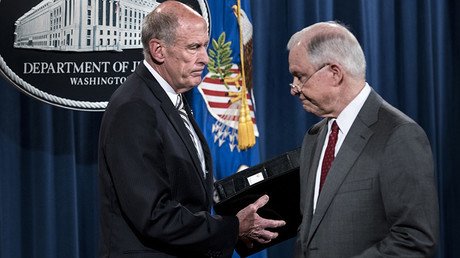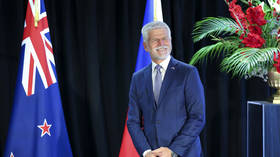New York Times encourages govt officials to leak secret information – internal emails
In an effort to obtain juicy anti-Trump leaks, the New York Times is soliciting such information from government employees, encouraging them to divulge information with the promise of anonymity, Breitbart reports, citing emails it obtained.
An email from New York Times (NYT) energy and environment correspondent Coral Davenport to John J. O’Grady, the president of the AFGE Council in Chicago which represents Environmental Protection Agency (EPA) workers, shows Davenport throwing bait at O’Grady, hoping he’d bite.
“As I mentioned, I’m working on a story looking specifically at concrete examples of unusual secretary at EPA,” Davenport writes.
“I’ve heard a lot of second-hand rumors, but in order to report these incidents, I’d need to have first-hand or eyewitness accounts. I’m looking for examples of things like, information being communicated only verbally when it would historically have been put in writing, people being told not to bring phones, laptops or even take notes in meetings where they would in the past typically have done so, eyewitness accounts of things like the administrator or top political appointees refusing to use official email, phones or computers, or any other specific, first-hand examples of practices that appear to demonstrate unprecedented secrecy or transparency," she continues.
page1 by Breitbart News on Scribd
page2 by Breitbart News on Scribd
Davenport goes on to promise anonymity for any leakers.
“While I’d like to speak to staff about these examples, I DON’T need to quote them by name or with any sort of identifying details that could in any way reveal the source of the information.”
“We’re VERY sensitive to the need to protect career folks who speak to us, and we DO NOT want to endanger anyone’s employment. But, in order to ensure that our reporting is based on facts rather than rumors, we do need to feel sure that the examples we give are based on first-hand or eyewitness experiences rather than second and third-hand rumors.”
Davenport then provides her contact information and encourages any wannabe leakers to text, call, email, or contact her on the encrypted phone apps WhatsApp or Signal.
However, she continues the email even after providing her details, brainstorming how her goal could be accomplished with O’Grady's help.
“Another way to do this might be through a combination of your interviews and my reporting,” Davenport wrote.
“If you gave put together multiple eyewitness accounts of a specific example of behavior that demonstrates an unprecedented lack of transparency, we could cite that. Or, if I speak to multiple people who describe, firsthand, such an example, I could cite that without needing any quotations. In general, the more folks I speak to who can offer specific, first-hand accounts of similar phenomena, the more I can write with authority in a broad way with no quotations or identifying details.”
In an effort to reassure O’Grady that she knows what she’s doing, she tells him that “we’ve already done this in a number of other stories this year...” going on to give four examples, all of which were critical of the Trump administration or EPA head Scott Pruitt.
READ MORE: ‘We’re after leakers, not journalists’: DOJ defends crackdown on leaks of classified info
Davenport then tells O’Grady to “feel free” to distribute her email around to anyone who may want to share stories with her.
Much to Davenport's delight, O’Grady does just that, forwarding Davenport's email to 34 EPA employees.
“Below is an e-mail I received from Coral Davenport of the New York Times,” O’Grady wrote to the employees. "She needs our assistance in verifying some information she has heard."
“Please feel free to contact Coral directly,” he wrote.
About half of the email addresses used by O’Grady were personal addresses of EPA employees, rather than their work emails. O’Grady's email was also a personal one. That fact is particularly ironic, Breitbart notes, considering Davenport was seeking evidence of government employees “refusing to use official email.”
However, a spokeswoman for the New York Times has maintained that the newspaper has done nothing wrong, implying that Davenport was merely going about her everyday journalistic tasks.
“The email demonstrates the process of reporting and gathering facts,” Rhoades-Ha told Breitbart in an email.
Political analyst Charles Ortel told RT that there's a big difference between Davenport's actions and those of a reporter who is simply trying to dig deeper into something they discovered themselves.
“When a journalist in effect colludes with member of the government bureaucracy to seek out stories that are damaging to one flank, one political wing, or one section of a political party, that’s a lot different from seeing trouble yourself and trying to get to the real bottom of the issue...” Ortel said.
“It sure looks to me like in the reporting that I saw on Breitbart and also the reaction to it, what you saw there were journalists trying to provoke bureaucrats into providing kernels of information that can be used to slam a political group or figure with which they disagree,” he said, adding that such actions describe a “political action organization rather than a true journalist.”
The revelations come as President Donald Trump and Attorney General Jeff Sessions crack down on leakers, wish Sessions saying last week that “we will not allow rogue anonymous sources with security clearances to sell out our country.”
The spotlight has finally been put on the low-life leakers! They will be caught!
— Donald J. Trump (@realDonaldTrump) February 16, 2017
Director of National Intelligence Dan Coats issued a stern warning for anyone considering leaking information.
“If you improperly disclose classified information, we will find you, we will investigate you, we will prosecute you to the full extent of the law, and you will not be happy with the result.”
The New York Times has long been a foe of Trump, who has taken to Twitter to slam the newspaper as “fake news” and “failing” on a regular basis.
“The failing @nytimes, which has made every wrong prediction about me including my big election win (apologized), is totally inept!” the president wrote on Monday.
The failing @nytimes, which has made every wrong prediction about me including my big election win (apologized), is totally inept!
— Donald J. Trump (@realDonaldTrump) August 7, 2017
“Somebody with aptitude and conviction should buy the FAKE NEWS and failing @nytimes and either run it correctly or let it fold with dignity!” he tweeted in January.
Somebody with aptitude and conviction should buy the FAKE NEWS and failing @nytimes and either run it correctly or let it fold with dignity!
— Donald J. Trump (@realDonaldTrump) January 29, 2017
“Really disgusting that the failing New York Times allows dishonest writers to totally fabricate stories,” Trump wrote while campaigning for president in January 2016.














